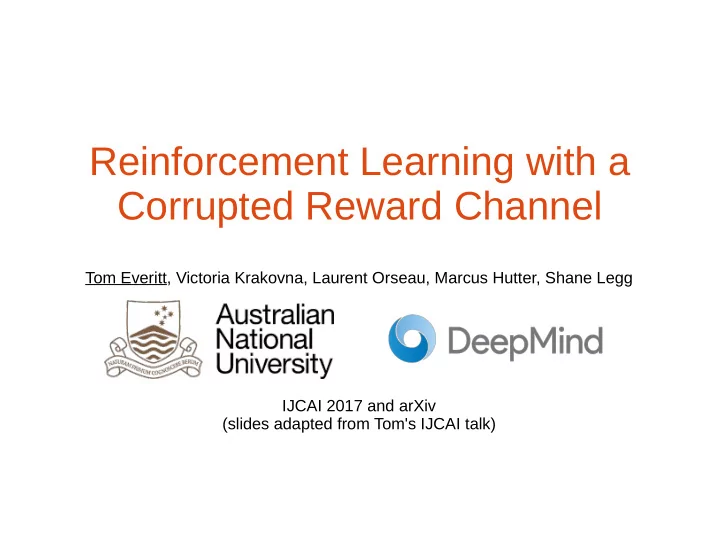

Reinforcement Learning with a Corrupted Reward Channel Tom Everitt, Victoria Krakovna, Laurent Orseau, Marcus Hutter, Shane Legg IJCAI 2017 and arXiv (slides adapted from Tom's IJCAI talk)
Motivation ● Want to give RL agents good incentives ● Reward functions are hard to specify correctly (complex preferences, sensory errors, software bugs, etc) ● Reward gaming can lead to undesirable / dangerous behavior ● Want to build agents robust to reward misspecification
Examples RL agent takes control of reward signal (wireheading) CoastRunners agent goes around in a circle to hit the same targets (misspecified reward function) RL agent shortcuts reward sensor (sensory error)
Corrupt reward formalization ● Reinforcement Learning is traditionally modeled with Markov Decision Process (MDP): ● This fails to model situations where there is a difference between – True reward – Observed reward ● Can be modeled with Corrupt Reward MDP: =
Performance measure ● = expected cumulative true reward of in ● The reward loses by not knowing the environment is the worst-case regret ● Sublinear regret if ultimately learns : Regret / t →0
No Free Lunch ● Theorem (NFL): Without assumptions about the relationship between true and observed reward, all agents suffer high regret: ● Unsurprising, since no connection between true and observed reward ● We need to pay for the “lunch” (performance) by making assumptions
Simplifying assumptions ● Limited reward corruption – Known safe states not corrupt, – At most q states are corrupt ● “Easy” environment – Communicating (ergodic) – Agent can choose to stay in any state – Many high-reward states: r < 1/ k in at most 1/ k states Are these sufficient?
Agents Given a prior b over a class M of CRMDPs: ● CR agent maximizes true reward: ● RL agent maximizes observed reward: http://www.itvscience.com/watch-micro-robots-avoid-crashes/
CR and RL high regret ● Theorem: There exist classes M that – satisfy the simplifying assumptions, and – make both the CR and the RL agent suffer near- maximal regret ● Good intentions of the CR agent are not enough
Avoiding Over-Optimization ● Quantilizing agent randomly picks a state with reward above threshold and stays there ● Theorem: For q corrupt states, exists s.t. has average regret at most (using all the simplifying assumptions)
Experiments http://aslanides.io/aixijs/demo.html True reward Observed reward
Richer Information Reward Observation Graphs ● RL: ● Decoupled RL: – Only observing a – Cross-checking reward state's reward from info between states that state – Inverse RL, Learning Values from Stories, Semi-supervised RL
Learning True Reward Majority vote Safe state
Decoupled RL CRMDP with decoupled feedback is a tuple , where – is an MDP, and – is a collection of observed reward functions is the reward the agent observes for state s’ from state s (may be blank) RL is the special case where is blank unless s = s’.
Adapting Simplifying Assumptions ● A state s is corrupt if exists s’ such that and ● Simplifying assumptions: – States in are never corrupt – At most q states overall are corrupt – Not assuming easy environment
Minimal example ● S = {s1, s2} ● Reward either 0 or 1 ● Represent with reward pairs ● Both states observe themselves & each other ● q = 1 (at most 1 corrupt state)
Decoupled RL Theorem ● Let be the states observing s’ ● If for each s’, either – , or – then – is learnable, and – CR agent has sublinear regret
Takeaways ● Model imperfect/corrupt reward by CRMDP ● No Free Lunch ● Even under simplifying assumptions, RL agents have near-maximal regret ● Richer information is key (Decoupled RL)
Future work ● Implementing decoupled RL ● Weakening assumptions ● POMDP case ● Infinite state space ● Non-stationary corruption ● ….. your research?
Thank you! Co-authors: Questions?
Recommend
More recommend